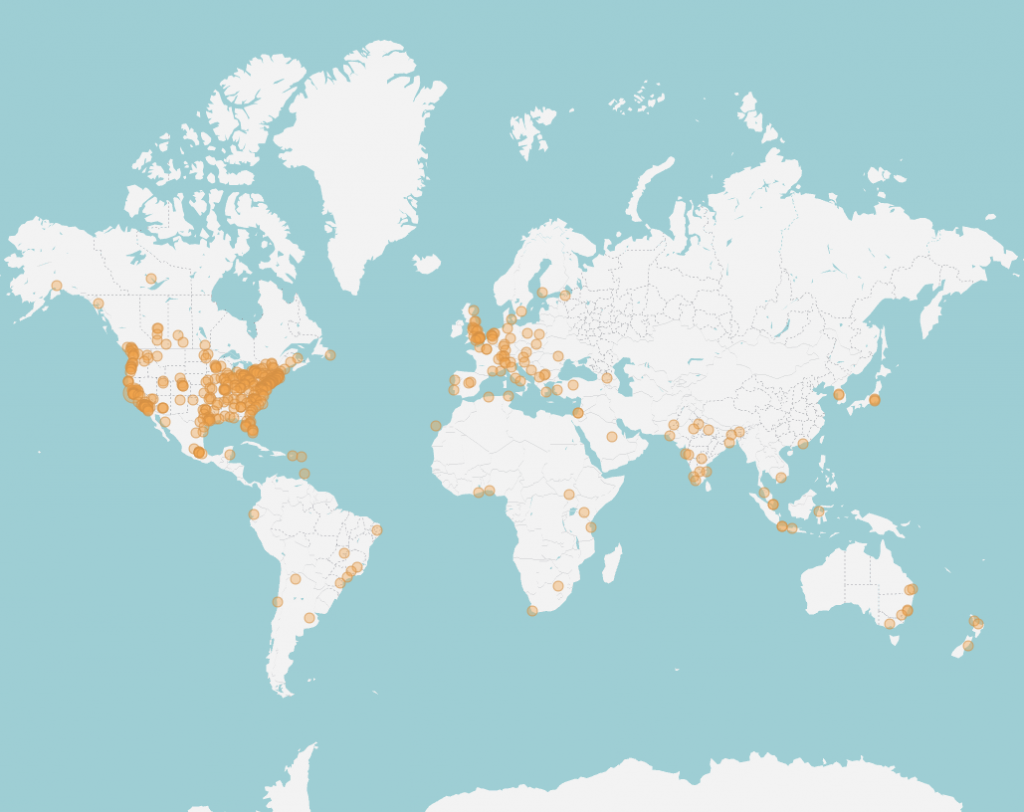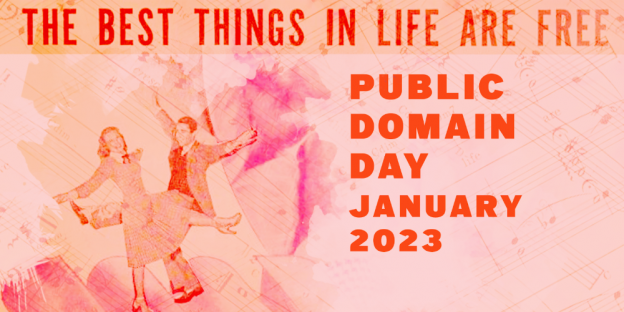People from around the world — many wearing their best roaring ‘20s attire — came to the Internet Archive’s online party on January 19 to toast creative works recently added to the public domain.
The event was hosted in partnership with SPARC, Creative Commons, Library Futures, Authors Alliance, Public Knowledge, and Duke’s Center for the Study of the Public Domain.
Watch recording
View table of contents & speakers
“We’re celebrating works published in 1927 becoming open to all in the United States where we can legally share, post, and build upon them without permission or fee,” said Jennifer Jenkins of the Center for the Study of the Public Domain at Duke Law School. “You’re free to reimagine the characters, the events, the settings, the imagery, and use them in your own stories, musical plays, and movies.”
Librarians and archivists are eager to preserve these cultural materials, the vast majority of which are out of circulation. Now that they’re in the public domain, anyone can preserve them and digitize them — making them more discoverable.
“The public domain is important because it enables access to cultural materials that might otherwise be lost to history,” Jenkins said.
Among some of the best-known works that entered the public domain in 2023 include books, such as To the Lighthouse by Virginia Wolfe and The Big Four by Agatha Christie; sheet music for The Best Things in Life Are Free and I Scream, You Scream, We All Scream For Ice Cream; silent movies such as Metropolis by Fritz Lang, Putting Pants on Phillip with Stan Laurel and Oliver Hardy.
The first full-length film featuring synchronized sound was produced in 1927: The Jazz Singer with Al Jolson.
Rob Byrne, a film restorer and president of the San Francisco Silent Film Festival, explained at the event that previous films were not truly silent since every motion picture performance in the 1920s was accompanied by live musicians—from full orchestras in big cities to single piano players in small town theaters. The average American went to the movies more than three times every week, and international movies were accepted because there were no language barriers, Bryne added.
Unfortunately, more than 80% of all the films produced prior to 1930 have been lost.
Even fewer films featuring Black casts made for Black audiences survived, said Cara Cadoo, associate professor of history, cinema and media studies at Indiana University. “Race has always been a part of the story of the American cinema,” she said.
It was because she could easily view movies in the public domain that Cadoo said she was recently able to discover a clip from a lost Black film. Through some detective work, she identified footage from the 1917 film, “The Trooper of Troop K,” while studying another film from 2023. “This history is something that just in recent decades, people have taken seriously,” Cadoo said.

Brigitte Vezina, director of policy and open culture at Creative Commons, explained that libraries, museums and archives still face big challenges simply to fulfill their mission in the digital world. (See report Barriers to Open Culture.) Institutions are working in an outdated framework and copyright policy reform is needed, she said.
“We’ve been promoting open culture to build a more equitable, accessible, and innovative world,” said Vezina, citing its new call to action policy guide. “It’s based on this rich experience that our open culture program supports better sharing of cultural heritage globally.”
Along with works celebrated from 1927, SPARC’s Nick Shockey talked about another important milestone in expanding public access to knowledge. In August, the White House Office of Science and Technology Policy issued new guidance that requires the federal government set the default to open for all publicly funded research in the United States.
“This will make over $80 billion each year in research produced with the support of U.S. taxpayer dollars immediately available to anyone online,” Shockey said. “The priority is part of a broader commitment to advancing equity in science and scholarship and recognizing the ways in which openness can be a powerful enabler of more equitable systems.”
The government has also set 2023 as the Year of Open Science. What is and is not publicly and openly accessible is a public policy question, said Shockey, noting the disappointing 20-year pause for the Canadian public domain.
“As we celebrate today, I hope the momentum that we generate can be channeled into ongoing advocacy to ensure that more and more of the knowledge that shapes our world is made available to everybody and to more fully realize the right of sharing knowledge,” Shockey said.
For an example of the value of free sharing of information from the federal government, Meredith Rose, senior policy counsel with Public Knowledge, highlighted NASA’s public posting of images from the Webb space telescope.
“Some things are born free,” said Internet founder Brewster Kahle. “Democracies around the world publish openly because they believe in education and they want it to be spread as widely as possible.”
Open does not always mean easily accessible, however. Kahle is working on Democracy’s Library, a project to gather government material from the U.S., Canada and around the world and preserve them in one place.
“This is the internet we’re dreaming of. Let’s go and make sure that it’s got all of the public domain materials publicly accessible – not just all those things that are from the classic era. Let’s go and celebrate the current public domain.”
Also presenting at the celebration was Rick Prelinger, an archivist, filmmaker, writer and educator. He began collecting ephemeral films (used for specific purposes such as advertising, educational and industrial films) in 1983. His collection of 60,000 films was acquired by the Library of Congress in 2002. He partnered with the Internet Archive to make a subset of the collection — now more than 8,500 films — available online for free viewing, downloading and reuse in the Prelinger Archive.
Throughout the program, students from the Snowden International School (Boston) and the Ruth Asawa San Francisco School of The Arts (San Francisco) read poetry newly entered into the public domain from Caroling Dusk: an anthology of verse by Negro poets by Countee Cullen.
Jennie Rose Halperin, executive director of Library Futures, and Lila Bailey, senior policy counsel at the Internet Archive co-hosted the party.
[Cross-posted blog with SPARC / Internet Archive]

How come we can’t download the video? It’s Public Domain, right?
Freedom means: there is much left to lose. Like our inner cities becoming private domain, we can not let money steal our time and space. Imagine if we can only enter a park after buying a ticket. If the world becomes a museum. There already is talk about us being coopted into having implanted chips, ‘digital wallet with GPS’. Rich people already have this to prevent being taken hostage, and some advertise how ‘easy’ it is to pay automatically by just being near a scanner that reads your chip. The technology is here, look at our pets. Thanks Brewster, for standing up for freedom and democracy, which are very close.